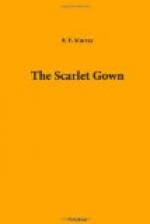Who might be, if she only chose,
As great a star.
She had a part in the tableaux
At the bazaar.
If I had said but little yet,
I now said less,
And smoked a home-made cigarette
In mute distress.
The smoke into his face was blown
By the wind’s action,
And this afforded me, I own,
Some satisfaction;
But still his tongue received no check
Till, coming home,
We stood beside the ancient wreck
And watched the foam
Wash in among the timbers, now
Sunk deep in sand,
Though I can well remember how
I used to stand
On windy days and hold my hat,
And idly turn
To read ‘Lovise, Frederikstad’
Upon her stern.
Her stern long since was buried quite,
And soon no trace
The absorbing sand will leave in sight
To mark her place.
This reverie was not permitted
To last too long.
Bell’s mind had left the stage, and flitted
To fields of song.
And now he spoke of Marmion
And Lewis Morris;
The former he at school had done,
Along with Horace.
His maiden aunts, no longer young,
But learned ladies,
Had lately sent him Songs Unsung,
Epic of Hades,
Gycia, and Gwen. He thought them
fine;
Not like that Browning,
Of whom he would not read a line,
He told me, frowning.
Talking of Horace—very clever,
Beyond a doubt,
But what the Satires meant, he never
Yet could make out.
I said I relished Satire Nine
Of the First Book;
But he had skipped to the divine
Eliza Cook.
He took occasion to declare,
In tones devoted,
How much he loved her old Arm-chair,
Which now he quoted.
And other poets he reviewed,
Some two or three,
Till, having touched on Thomas Hood,
He turned to me.
’Have you been stringing any rhymes
Of late?’ he said.
I could not lie, but several times
I shook my head.
The last straw to the earth will bow
The o’erloaded camel,
And surely I resembled now
That ill-used mammal.
See how a thankless world regards
The gifted choir
Of minstrels, singers, poets, bards,
Who sweep the lyre.
This is the recompense we meet
In our vocation.
We bear the burden and the heat
Of inspiration;
The beauties of the earth we sing
In glowing numbers,
And to the ‘reading public’ bring
Post-prandial slumbers;
We save from Mammon’s gross dominion
These sordid times . . .
And all this, in the world’s opinion,
Is ‘stringing rhymes.’
It is as if a man should say,
In accents mild,
’Have you been stringing beads to-day,
My gentle child?’




